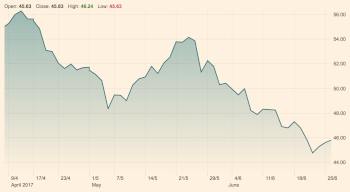Kraken now expected to contribute very little to 2017 Group production, resulting in flat growth from H1 to H2
Companies: EnQuest PLC
As is often the case with developing complex oil fields, there is a stark difference between meeting that "first oil" date and actually ramping up ongoing production.
EnQuest delivered well on its flagship Kraken field against the first metric of achieving first oil on time, as well as under budget as the slump in oil prices allowed it to squeeze costs down.
However, today's update is disappointing to the market in that the commissioning of Kraken's FPSO (Floating Production Storage and Offload vessel) is taking longer than expected. It is a heavy oil field which certainly adds complication and commissioning a complex FPSO on a development that cost $4bn is tricky at the best of times.
Kraken contributed effectively zero to the Group production in H1 2017.
Management has now guided the market to zero production growth for the full year, compared to the 37,015 barrels per day achieved in H1, meaning we can expect very little contribution from Kraken in H2 either:
"Production for the first half of 2017 was 37,015 Boepd. With prolonged commissioning leading to lower than expected operational efficiency from the Kraken FPSO vessel to date, production volumes have been lower than forecast and EnQuest's overall average daily production for the full year 2017 is now anticipated to be as per the first half 2017 production rate, plus or minus 10%"
The shares have fallen c.10% as a result. Surprisingly Cairn Energy (the other main equity holder in Kraken) is actually up today, although Cairn's value is more geared to its interests in Senegal.
Stephane Foucaud of GMP FirstEnergy flagged the production ramp up as an issue in a note in June stating:
"Kraken is a heavy oil field with a large underlying aquifer and the key risk is now around water cut evolution and oil production ramp-up".
As an indication of market expectations, Whitman Howard's forecasts for 2017 full year production were 46,400 barrels per day. Today's guidance cut to 37,000 barrels per day is a big c.20% drop versus those expectations.
Hopefully, this ramp up won't be reminiscent of the pain experienced at Premier's Solan field back in 2015/16, and the field will progress in 2018 towards its targeted 50,000 barrels per day plateau.










